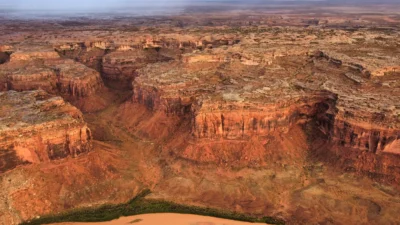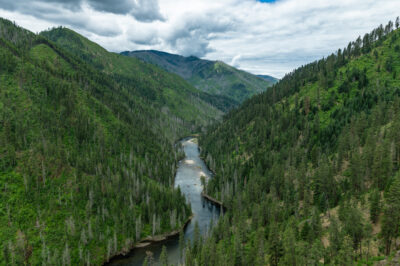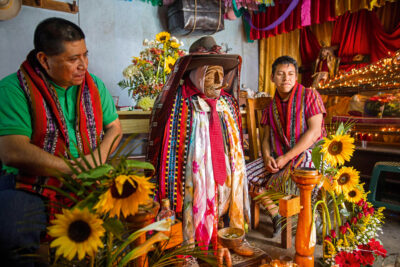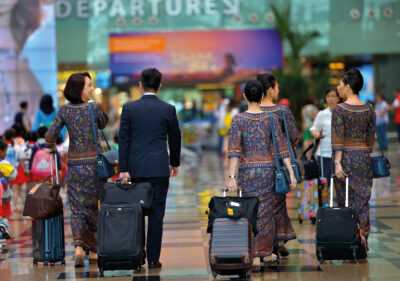
Invictus Games 2025: why British Columbia is becoming a hub for accessible winter adventure
With the seventh Invictus Games in full swing, Sophie Morgan journeys to Canada’s Vancouver and Whistler to discover how the accessible sporting event is shaping its host destinations…
I will never forget the moment when – six months after a traumatic injury left me permanently paralysed and wheelchair-dependent for the rest of my life – I sat in stunned, snow-muffled silence and took in my surroundings on a frozen lake in Muskoka, Ontario. For months I’d been cocooned in a spinal rehab facility in North London, struggling to come to terms with my new reality. But, enveloped by nature and with only the snow-laden white pines for company, my mind whirred with possibility.
It was my first time travelling with a disability and my first venture into the great unknown. The outdoors ignited hope in me in ways hospital walls never could. It made me question: if a person so freshly broken – both physically and emotionally – could access such a seemingly inaccessible environment and experience this level of exhilaration and gratitude, what else was possible?
So, returning to Canada on the cusp of an event created for wounded, injured and sick service people and veterans struck a chord within me. The seventh edition of the Invictus Games, founded by Prince Harry in 2014, was headed to Vancouver and Whistler in British Columbia, and – eager to witness its impact – so was I.

For the first time, the 2025 Games (8 Feb 2025–16 Feb 2025) are featuring adaptive winter sports. Alpine skiing, snowboarding, biathlon, Nordic skiing, skeleton and wheelchair curling events have been added to an existing roster that includes indoor rowing, sitting volleyball, swimming, wheelchair basketball and wheelchair rugby.
Hosting a hybrid event of this scale demands more than just world-class competition venues. It requires a destination equipped to welcome more than 500 athletes with physical, sensory and intellectual disabilities from 23 nations, along with their extensive support teams. Vancouver and Whistler have risen to the challenge, their successful bid bolstered by the legacy of the 2010 Paralympics. But, as I soon discovered, there was much more to the story.
Into the mountains
There’s something uniquely thrilling about heading into the mountains under the cover of night. As my vehicle carried me towards Whistler, the volcanic peaks of the coastal mountain ranges watched on like silent sentinels. The route from Vancouver traced an ancient path through the Indigenous Musqueam, Tsleil-Waututh and Squamish lands, stretching from the ocean all the way to the snow-capped heights of the Lil’wat territories. But, hidden by darkness, the breathtaking scenery of the Sea-to-Sky highway – which wiggles from Vancouver to Pemberton, north of Whistler – would have to remain secret until daylight.

Yellow-and-black Invictus welcome banners signalled our arrival into Whistler, home of the Whistler Blackcomb ski resort. ‘I Am Excited’ and ‘I Am Courageous’, the banners declared, further fanning the feeling of anticipation. This, combined with the promise of a bluebird morning, made for an impatient (albeit luxuriously comfortable) night’s sleep at the Fairmont Chateau Whistler. The countdown to the Games was on, and tomorrow I would explore just how accessible this renowned resort really was.
“Sitting in my wheelchair atop the mountain… I felt that rising sense of invincibility once more.”
“It’s not fully accessible here yet!” said Omer Dagan of Whistler Blackcomb, who had met me at the base of the mountain in Whistler Village the following day with an apologetic smile. Thanks to a dedicated accessibility line, we bypassed a crowd of clumsy skiers reapplying sunscreen and headed past a neat stack of sit-ski transporters and spare wheelchairs. We then approached a friendly lift attendant (who called out to colleagues to slow down the lift) and entered a step-free, wide-entranced gondola. I reassured Omer that the word ‘accessible’ was undoubtedly relative and, more often than not, subjective.

“The Paralympics were a fantastic starting point for Whistler,” Omer said as the doors closed and we wrapped our legs in blankets for the 30-minute ascent. “However, while the mountains themselves were successfully adapted for sit-skiers and other Paralympic athletes, we learned that the real barriers for guests with access requirements were in the built environment.”
Working towards an accessible future
Soon, the spectacular view of the largest ski area in North America opened up. Whistler Blackcomb welcomes millions of international guests each year and, with nearly one in five of the global population identifying as Disabled – plus the fact that the resort’s key demographic was ageing into disability – improved accessibility had been recognised as both a moral and economic imperative by owners Vail Resorts. Therefore, Whistler Blackcomb had recently become the first ski resort in Canada – and the world – to undergo a rigorous accessibility audit.
Some key buildings – including the Gondola building, the Roundhouse Lodge and Blackcomb Day Lodge – have been rated and, after installing an interior ramp and changing flooring, the Roundhouse Lodge building was certified.
“I know the power of adaptive sports: that rush of independence, that spark of confidence, that deep, soul-shaking reminder that I am limitless.”
Crystal snowflakes of what is known locally as ‘champagne powder’ fell around us like glitter in the air. The Garibaldi and Fitzsimmons mountain ranges and the glassy expanse of Lost Lake were finally visible in the distance. Sitting in my wheelchair atop the mountain, posing for a photo on the blue carpet of accessibility, I felt that rising sense of invincibility once more. “We call that ‘mountain medicine’,” Omer laughed.

Speaking with me later over a steaming bowl of soup in mountain restaurant Steeps, Jen Brown of Whistler Adaptive Sports (WAS) said that the Games were beginning to remove financial barriers too. “Events like this help drive demand, and that helps the cost of adaptive sports and equipment come down.” WAS, an adaptive sports non-profit that is more than 20 years old, had trained adaptive instructors to be able to help Invictus competitors, many of whom would be new to mountain sports.
“Unlike the Paralympics, winning medals isn’t the goal – healing is,” Kayleigh Pierce, a Team UK competitor, told me later. “For most competitors, just getting to the start line is the victory. Out here in the mountains, my wheelchair doesn’t matter; the mountain doesn’t care about my disability. I know the power of adaptive sports: that rush of independence, that spark of confidence, that deep, soul-shaking reminder that I am limitless. And I’ve seen it in others too – that moment when the mountain changes them, just like it changed me.”

The Games are making a profound impact on the destination’s journey to adaptation beyond the mountains too. The Invictus Foundation brought in veterans with lived experience to audit local hotels and consult on changes in order to accommodate the varying needs of the teams. Back at the resort, I traded the excitement of the slopes for the tranquillity of the award-winning Four Seasons spa and can confirm that access was impeccable. All in the name of research, of course – somebody’s got to do the hard work.
Indigenous roots
Just as the Invictus Games Foundation prioritised accessibility, they also worked to ensure a meaningful, lasting impact for the four host First Nations: the Squamish, Lil’wat, Musqueam and Tsleil-Waututh. The brand identity was co-created with local artists, their traditional Indigenous designs etched into the medals and emblazoned across gondola wraps (an initiative led by Vail Resorts). The partnership ensured that the four host First Nations’ cultures (including their languages) would be meaningfully and authentically represented at every stage of the Games.
Translated from Latin, ‘Invictus’ means ‘unconquered’. This word, along with the Games’ core values – resilience, determination and courage – carry great resonance in these ancestral lands and within both Indigenous and veteran communities.
“We too struggle with trauma,” Chief Jen Thomas of the Tsleil-Waututh Nation told me in the Invictus Village, drawing a poignant parallel between Indigenous and veteran communities. Generational wounds from the past – born out of harmful policies that tore Indigenous children from their families and placed them in residential schools, some as recently as the 1990s – continue to leave deep scars. The discovery of unmarked graves has also forced a national reckoning. While the Canadian government works to acknowledge and atone for these injustices, another force is aiding in reparations in unexpected ways: responsible tourism.
“We too are on a healing journey,” Chief Thomas continued. “The First Nations and Invictus journeys are identical. In the shadow of the mountains, those journeys intertwine, unconquered, unbroken and moving forward together.”

Let the games begin
A chilly Vancouver buzzed with excitement ahead of the opening ceremony. The city was packed with elated Invictus supporters in their bright yellow jackets, while international superstars including Katy Perry and Chris Martin were inbound, as was Prince Harry himself.
Rushing to BC Place, I accidentally rolled into a pack of power-walking Vancouver locals as they maintained their step count along the city’s famous ‘seawall’, the world’s longest uninterrupted – and step-free – waterfront path.
“You go, girl!” a confused lululemon-clad woman cheered me on as I pushed along, munching on a Lee’s donut from Granville Island Public Market. I may not be a competitor, but I welcomed the sentiment. It reminded me of the 2012 London Paralympics, when pride, not pity, reshaped public perception of disability in my home city. Invictus, like the Paralympics, was a movement, not just a moment, and the spirit of the Games in Vancouver was palpable.
The stream of competitors arrived into the stadium – bands of warriors welcomed by Disabled performers, Indigenous leaders, government politicians and dignitaries.
The Invictus Games would soon be broadcast to audiences worldwide, and awareness of Whistler’s and Vancouver’s evolving commitment to accessibility would only help accelerate the pace of change. While the long-term impact of the Invictus Games 2025 remains to be seen, Whistler and Vancouver are firmly on their journey to accessibility and beyond. And with inclusive and sports tourism trends on the rise, they leave behind a legacy and blueprint that can be followed by others. Let the Games begin!
Need to know
Getting there
Air Canada offers non-stop flights from London Heathrow Airport (LHR) to Vancouver International Airport (YVR), with an average flight time of around 10 hours. Air Canada and Vancouver International Airport are well prepared for disabled flyers – check aircanada.com and yrv.ca for more information.
Getting around
See destinationvancounver.com and translink.ca for details on Translink, Vancouver’s extensive and accessible public transport network. Meanwhile, Aquabus Ferries services destinations along False Creek, including Granville Island, with its popular market.
Accessible accommodation
The Fairmont Chateau Whistler offers a lesson in luxury, with accessible rooms and restaurants, plus a health club and fitness centre. In Vancouver, make your base at the Opus Hotel, a boutique bolthole with three accessible Superior King Rooms.
The author’s trip was supported by Tourism Whistler (whistler.com) and Destination Vancouver (destinationvancouver.com).




















